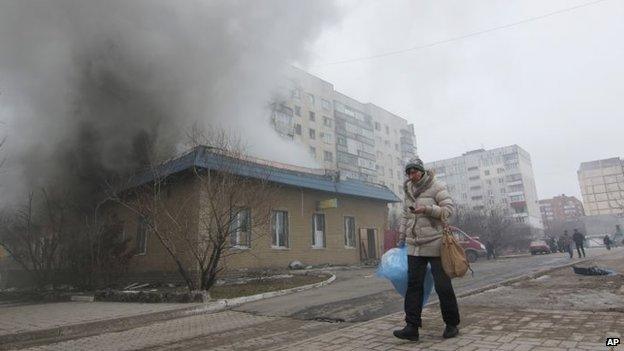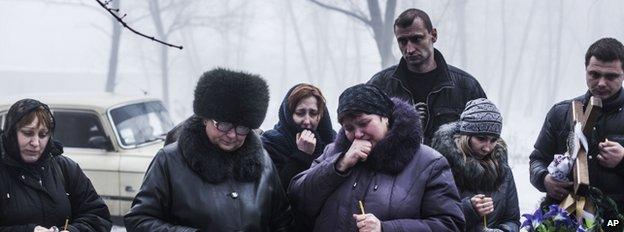Rockets kill 30 in Mariupol as rebels launch offensive
- Published
"Until this moment Mariupol had been outside of the fighting, now bodies lie in the streets, says the BBC's David Stern
A series of rocket attacks has left 30 people dead and many more injured in the city of Mariupol in east Ukraine.
Ukraine blamed pro-Russia rebels, but the separatists said Ukrainian forces were behind the attacks.
East Ukraine's main rebel leader claimed he had begun an offensive against Mariupol, but later said he "will not storm the city".
The Organisation for Security and Co-operation in Europe (OSCE) said the rockets came from rebel-held areas.
But Alexander Zakharchenko, head of the self-proclaimed Donetsk People's Republic, said his forces had not carried out "active operations" near Mariupol until Saturday, Russian news agencies report.
However, he added that after Kiev blamed the rebels for the attack, he ordered his troops to "neutralise" the positions of Ukrainian troops east of the port city.
Meanwhile, Ukraine's security service has published what it claims are intercepted audio messages between separatist rebels speaking about the Mariupol attack.
The authenticity of the messages has not been independently verified.
No truce talks

The port city of Mariupol is of great importance to the rebels
International organisations, including the European Union, condemned the attacks.
The OSCE called the incident "reckless, indiscriminate and disgraceful" and demanded a full investigation.
Nato also criticised the attacks, adding that "Russian troops in eastern Ukraine are supporting these offensive operations" by supplying weapons.
Ukraine's Defence Minister Stepan Poltorak said military positions in Mariupol were being strengthened.
His ministry said the city had been hit by three separate strikes by Grad rockets.
Ukraine's Prime Minister Arseniy Yatseniuk has called for a special meeting of the United Nations Security Council to discuss what he says is Russia's role in the conflict in eastern Ukraine.
"Russia is not only breaching the Minsk agreements - Russia is violating the fundamental principles of international law and humanity," Mr Yatseniuk told a meeting in Kiev.
Meanwhile, Ukrainian President Petro Poroshenko has announced he is returning early from a trip to Saudi Arabia to plan a response to events in Mariupol.
He denounced the incident as "a crime against humanity" and called on the rebels "to name their sponsors".
Strategic city

The incident comes a day after Mr Zakharchenko said he did not want truce talks with Kiev.
On Saturday he claimed the Mariupol offensive would be "the best possible monument to all our dead".
The rebel leader made his comments at a memorial ceremony for those killed in an artillery attack on a bus stop in the rebel-held city of Donetsk on Friday.
Mariupol has a population of 500,000 and is in a highly strategic position, sitting between rebel-held eastern areas and Crimea, which was annexed by Russia last March. The city saw heavy fighting in August.
Unverified video footage on Saturday indicated that a number of cars, houses and apartment buildings had been struck and were in flames.
The BBC's David Stern says the attack appeared to come from a multiple-rocket launcher, which fires a large number of missiles over a spread-out area.
Mayor killed
Also on Friday, rebel military spokesman Eduard Basurin said 24 rebels had been killed and 30 wounded in recent fighting. He called it "the heaviest losses in our ranks" in a 24-hour period.
In another development, the rebel mayor of Pervomaysk, west of Luhansk, has been killed, reports say.
The body of Yevhen Ischchenko was found in a car. Three other men were apparently killed along with him. The local rebel leadership blamed Ukrainian agents, but other sources said it was the result of infighting.
Since April, more than 5,000 people have died in fighting in the east.
The rebels currently control a large swathe of the Donetsk and Luhansk regions. More than a million people have been displaced.
A ceasefire was agreed in Minsk in September but never fully took hold.
Ukraine: the human cost

Some 5.2 million people live in conflict-affected areas and 1.4 million are considered "highly vulnerable and in need of assistance"
More than a million people have fled their homes with 633,523 living as displaced persons within Ukraine and 593,622 living outside Ukraine, mostly in Russia
More than 5,000 people have been killed in the fighting and more than 10,300 injured
Source: UN report of 9 January, external for refugee figures; news reports for casualty estimates

Are you in Mariupol? Have you been affected by recent events? You can email haveyoursay@bbc.co.uk, external with your experience. Please include a telephone number if you are willing to be contacted by a BBC journalist.
Send your pictures and videos to yourpics@bbc.co.uk, external or text them to 61124 (UK) or +44 7624 800 100 (international). Or you can upload here, external.